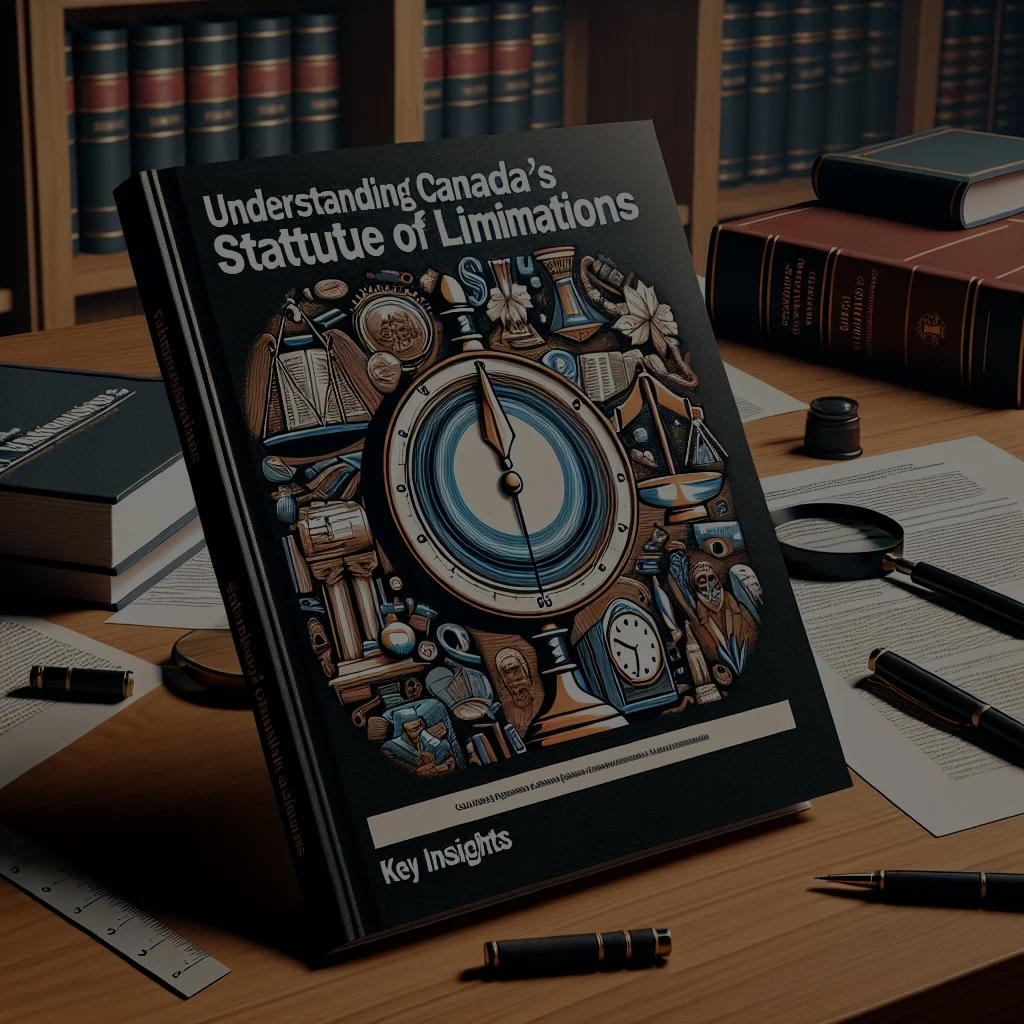Canada’s legal landscape is complex and nuanced, particularly when it comes to the statute of limitations. This legal framework sets forth the maximum time period within which a party may initiate a lawsuit, thereby influencing the ability to seek justice. Understanding the nuances of Canada’s statute of limitations is crucial for individuals and businesses alike, as it can have significant implications on legal rights and obligations. In this article, we will explore the basics of the statute of limitations, how these time limits affect legal claims across Canada, exceptions to the rule, and the importance of seeking professional guidance in navigating this intricate legal territory.
The Basics of Canada’s Statute of Limitations Explained
In Canada, the statute of limitations refers to laws that establish the maximum time frame within which legal proceedings must be initiated. These statutes vary by province and territory, and they cover various types of claims, such as personal injury, contract disputes, and property damage. Generally, the time limits start to run from the date the cause of action arises, meaning when the claimant becomes aware of the harm or injury that has occurred. This awareness can include situations where the injured party could have reasonably discovered the facts leading to the claim.
Each province and territory in Canada has its own limitations act, which prescribes different limitation periods. For instance, in Ontario, the Limitations Act generally imposes a two-year limit for tort claims and a six-year limit for breach of contract claims. Conversely, British Columbia has a similar two-year limitation for most claims. Although these timelines may seem straightforward, they can be influenced by various factors, such as the claimant’s age, mental capacity, or if the defendant is a government entity.
Understanding these basic principles is essential for anyone contemplating legal action in Canada. Failure to initiate a lawsuit within the prescribed time frame can result in the dismissal of the claim, even if it is valid. As such, individuals must be proactive in seeking legal recourse to safeguard their rights and interests.
How Time Limits Impact Legal Claims Across Canada
The implications of time limits set forth by Canada’s statutes of limitations are far-reaching. In many instances, the expiration of the limitation period can effectively bar a claimant from pursuing their case, irrespective of its merits. This aspect of the law often creates an urgent need for claimants to gather evidence and file lawsuits promptly. Moreover, the pressure to act quickly can complicate the decision-making process for those who may be facing emotional distress or financial uncertainty due to their circumstances.
In commercial contexts, businesses must also heed the implications of these statutes. A delay in pursuing a claim can result in lost revenue or exacerbated financial damage. Companies often find themselves navigating complex relationships with suppliers, clients, or employees, where the timing of legal actions can significantly impact their operations. Consequently, businesses are encouraged to adopt proactive risk management strategies, including regular legal reviews and assessments of potential claims.
Additionally, the variations in limitation periods across provinces can create challenges for individuals and organizations operating in multiple jurisdictions. Confusion can arise when parties are unsure which law applies to their situation, leading to potential pitfalls. As such, it is imperative for claimants to be aware of the specific limitation periods relevant to their legal circumstances, as they can differ markedly from one region to another.
Exceptions to the Rule: When Time Limits Don’t Apply
While statutes of limitations provide critical timelines for legal claims, there are important exceptions to these rules. Certain circumstances can toll, or pause, the running of the limitation period. For example, if a claimant is a minor or mentally incapacitated at the time the cause of action arises, the limitation period may be extended until the individual reaches the age of majority or regains mental capacity. This ensures that vulnerable populations are not unfairly disadvantaged by the limitations imposed by the law.
Another notable exception arises in instances of fraudulent concealment. If a defendant has actively concealed their wrongdoing, the limitation period may not start until the claimant discovers the fraud. This exception serves to protect individuals who may not be aware of their legal rights due to deceitful actions taken by the opposing party. Claimants must substantiate their claims of fraud with compelling evidence to benefit from this exception, adding another layer of complexity to the legal process.
In addition to these specific exceptions, some provinces have enacted laws that extend limitation periods for certain types of claims, such as sexual assault or abuse. These laws reflect a growing recognition of the unique challenges faced by survivors of such offenses, allowing them more time to seek justice. Overall, understanding these exceptions is vital for anyone considering legal action, as they can significantly impact the practical application of the statute of limitations.
Navigating Legal Waters: Seeking Professional Guidance
Given the intricate nature of the statute of limitations and its substantial implications on legal claims, seeking professional legal guidance is highly advisable. Legal professionals have the expertise to navigate the complexities of the law, ensuring that claimants are fully informed of their rights and obligations. They can provide invaluable support in assessing the viability of a claim, determining the applicable limitation period, and strategizing the best course of action to pursue legal recourse.
In addition, legal counsel can help identify any applicable exceptions to the statute of limitations that may apply to a specific case. This guidance is especially crucial in complex matters involving multiple jurisdictions or unique circumstances, as an experienced attorney can navigate the intricacies of the law and provide clarity amidst uncertainty. A lawyer’s insights can also assist individuals in making informed decisions about their cases, weighing the potential benefits and consequences of pursuing litigation.
Furthermore, establishing a relationship with a qualified attorney early in the process can prove beneficial, allowing for strategic planning and timely action. Delaying legal consultation can lead to missed deadlines or lost opportunities for redress. Consequently, individuals and businesses should prioritize seeking professional legal advice when dealing with potential claims, enabling them to protect their interests effectively.
Understanding Canada’s statute of limitations is imperative for anyone considering legal action. The time limits imposed by the law can significantly impact the ability to pursue claims, while exceptions exist that may alter these timelines. Navigating this complex legal terrain requires a proactive approach and the guidance of experienced professionals. By recognizing the importance of timely action and seeking appropriate legal counsel, individuals and organizations can better safeguard their rights within the Canadian legal system.
Navigating the Appeal Process: A Guide for Canadian CourtsUnderstanding Impaired Driving Penalties Across CanadaUnderstanding Your Rights When Arrested in CanadaRelevant LinkRelevant LinkRelevant LinkNavigating the Appeal Process: A Guide for Canadian CourtsUnderstanding Impaired Driving Penalties Across CanadaUnderstanding Your Rights When Arrested in CanadaRelevant LinkRelevant LinkRelevant Link



